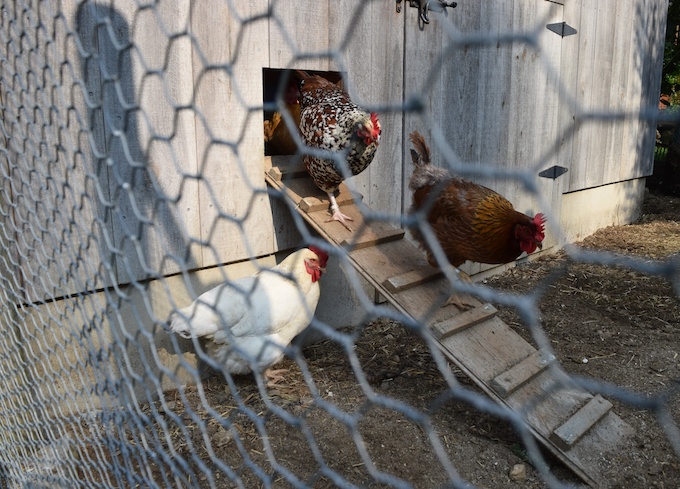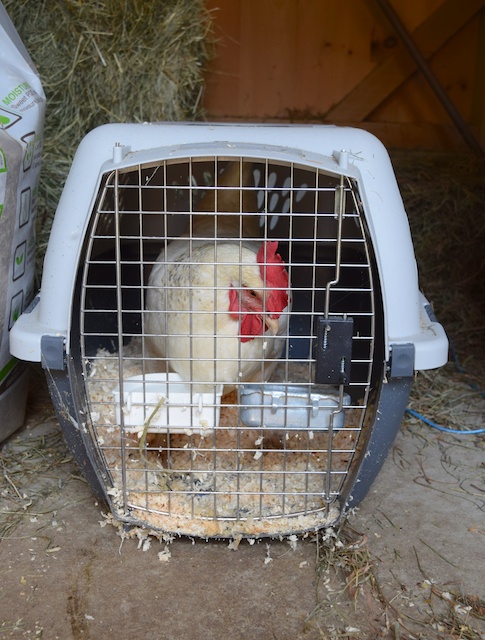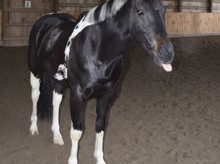This morning, when I went to let the Gems out, I noticed that Opal was still on the roost. That’s unusual for her. She looked okay, but the fact that she wasn’t on the floor of the barn, active and about, had me concerned. I picked her up and listened for respiratory distress. Nothing that I heard (though my hearing isn’t the best.) I checked her crop. Full. I looked at her bottom and her vent and didn’t find or feel anything unusual. I set her down. She walked off. I finished my chores.
An hour later I checked on the flock. The other hens were busy doing their morning scratching around. Opal was under the ramp. I watched. She closed her eyes and looked sleepy.
When I went into the pen, she took on a normal stance. Sick hens will do this, which is why I like to observe them from a distance before rushing in to handle them.
She was easy to catch, which was another sign that something is amiss.
At this point all I know is that Opal is feeling off. This is exactly the type of situation for which I isolate a hen. If Opal is carrying a contagious disease, isolation might help to protect the rest of the flock – although certainly they’ve already been exposed to the pathogen. Mostly, I isolate so that I can gather more clues. I’ll be looking for:
breathing issues
swollen eyes
appetite (is she eating at all?)
is she able to drink?
is she producing manure?
if there is manure, what quantity, color and consistency?
does she become more lethargic?
what is her stance?
does her comb change color?
is she laying?
does she show signs of wanting to lay an egg but is unable to?
The Gems are now three years old and heading into the molt. They’ve been having issues with thin-shelled eggs. Opal is a breed that was originally created in the 1940s as a meat bird. She’s heavy and she’s been a consistent producer of big brown eggs. Much can go wrong inside of an older hen like her. Or, she could be developing a respiratory disease. The only way I’ll know what’s going on is to isolate Opal and observe her carefully.
If you have to isolate a chicken, try to do what I’ve done here. Do not bring her into your house. She could be shedding pathogens. She will surely stink. She won’t get any comfort by being in your kitchen. Keep her in the shade or in the barn, somewhere quiet, but with fresh air. Some hens get anxious if they can’t see their flock, others stay calmer out of view of the others. Use your judgement. Put fresh water and laying hen pellets in front of her. Don’t immediately try to feed with high-value treats. Many ill hens have intestinal issues, and making them eat only causes suffering. Let her be and check in to observe any changes. Then you’ll be able to determine what to do next.
I’ll let you know what I’m going to do for Opal. Hopefully the prognosis will be obvious by this evening, but, I’ve seen enough ill hens, and done enough necropsies to know that a clear diagnosis is rare. We’ll just have to wait and see.




Thank you, Terry, for your calm and steady advice. My girls are two years old and having laying issues so I’ll be keeping my eye on them. I hope Opal recovers soon and can go back in with her flock.
Great advice! I think the careful daily observation, is paramount. I have often had a hen go “south” because I saw the early signs and didn’t act accordingly. The signs just didn’t register. Like you, you need to take a calm breath, and really observe.
Ill be watching this closely. I am in my third year of keeping chickens, and unferstand better why they were never meant to be pets. They have a short span of “usefullness”, and a true farmer or someone depending on them for food could and would not keep them beyond this point. But they are so darn adorable even if most of mine (except the babies” are just money eating macjines. Oh well im in it for the long haul. I love them. Hope opal is okay
Fingers crossed it’s nothing contagious.
Thank you for this post Terry. My egg bound hen is also a Delaware…she is huge..she lays HUGE brown eggs which explains what is going on with her.
We JUST had an issue with our 9-month-old Delaware: one day she appeared a little lethargic and stayed close to the coop, even when I let the girls out to forage in the yard. She would doze for a while with her head crooked upside-down on her neck/chest area. And then suddenly she would wake and use her beak/nose to repeatedly rub the side of her neck (she never picked or stratched or bit at it, just rubbed it furiously) all the while scooting backwards like Michael Jackson until she bumped into something that startled her out of the rubbing. Then she would go back to dozing with her head upside-down on her chest.
We let this go on for a couple of days because she appeared happy, was eating and drinking, and roosting with the flock (at the time, she was 1 of 4 hens). Then we noticed that she had a hard time getting down from the coop: she would walk to the pop door, look out, turn her head upside-down, place her foot on the ramp, and then get “dizzy” and wobble back inside the coop. Eventually we had to pick her up and put her on the ground, where she would do the rubbing + moon walk all over again.
At this point she had stopped laying, only ate fruit scraps and drank water, and slept most of the day in the shade. I checked the Internet, checked the Hen Cam blog (my go-to for EVERYTHING chicken related) and even called some friends who have been keeping chickens for 10+ years: no luck! I gave her the spa treatment and force-fed her some olive oil (because I read it might help her pass anything that’s stuck). She just seemed to be getting worse and losing lots of weight. My chicken friends suggested buying some generic antibiotic at the feed store, which we were going to do the next morning after church, but she passed that night in the coop.
Never figured out what was ailing her (and we did not do a necropsy). Any ideas chicken friends? The rest of the flock seems unaware of what happened: our Barred Rock moved to the top of the pecking order, and we purchased two chicks to graft into the flock via our broody Ameraucana.
There’s an issue called wry neck. I’ve never had it here. There’s a strong genetic link to it. If you Google it you’ll find a lot of home remedies. Or, it could be something else. These sort of odd diseases that aren’t contagious and don’t cause economic hardship are not studied.
like to watch what goes on at your place.i would love to have a few goats if we had the room.
Great advice!
I hope Opal is ok!
Aw, Opal. I’m hoping that it’s a passing phase. Thank you for the lessons, Terry.
I hope so too – that it’s a passing phase, that she just ate something when she was out foraging that didn’t agree with her. Maybe a spa treatment would help? It must be disconcerting that she doesn’t have any obvious symptoms, but just “isn’t her usual self “
awww Opal. Hoping all goes well. I know you will keep her comfortable and do the right thing for her Terry.
How is Opal this morning??
I was happy to see Opal back in the big barn scratching about with her flockmates this morning. She looked to be back to normal. Hope that’s the case. :-)
Just did the “Spa Treatment” on a 20 week old Sicilian Buttercup. Noticed 3 days ago that something was very off. She’s the bottom of the pecking order and my first inclination was that she wasn’t being allowed any food or water and had become so weak she was in big trouble. I isolated her, her poo was straight water with a milky appearance. Gave her water by medicine dropper full several times over the next 24 hours, she began to nibble at lay feed, some cracked wheat. Her poo became green, she seemed to become less lethargic (Like Opal, Buttercup had been very sleepy and only stood up when we approached her play pen area) but only slightly so. Tonight, the spa treatment and some Olive oil. After the blow dry, put her back in her private pen….she was quick to preen her feathers and then shot poo out about a foot, watery with a green tinge. Your blog indicates green is a very bad sign in diarrhea. This being my first flock, I’m at a loss what to do now. Feeling like this Buttercup breed may be a bit too high maintenance for the beginning back yard chicken”er”. Thanks for your great website. Hope Opal AND Buttercup recover from this.
Green manure, and shooting white stuff, is bad. I’m sorry that you’ve come across this ailment so soon in your chicken keeping life. If she doesn’t respond to the spa treatment, and she has the lethargic symptoms you describe, she likely is afflicted with something that is not curable. Sadly, such ailments are not uncommon with chickens. Much can go wrong with their reproductive tracts. I can’t tell you exactly what is going on – the symptoms are the same for a variety of problems, from cancer to peritonitis. Despite the severity, it can take a hen a long time to pass away on her own. Put normal food and water in front of her. If she doesnt eat, don’t insist. In a couple of days, if she doesn’t revive, it is a kindness to euthanize. Or let her go on her own terms. This sort of thing is what most of the “chicken keeping is easy and delightful, and it’s all about charming decoration” blogs don’t talk about. So, maybe I err on the side of hard reality. But for me, it’s all about the animals, and as their keepers the end of life is as important as the beginning.